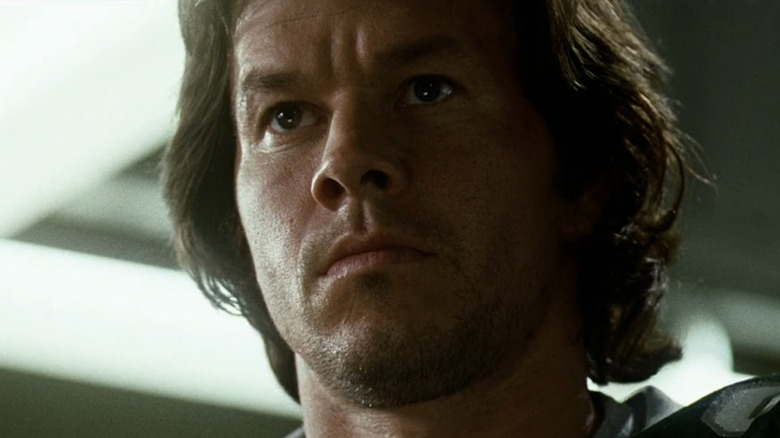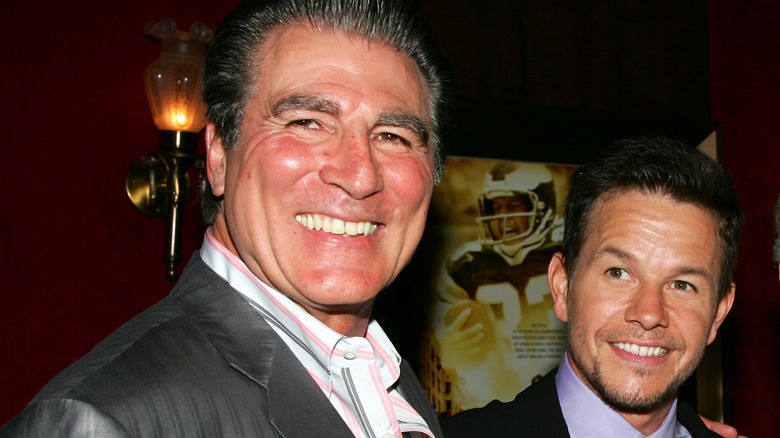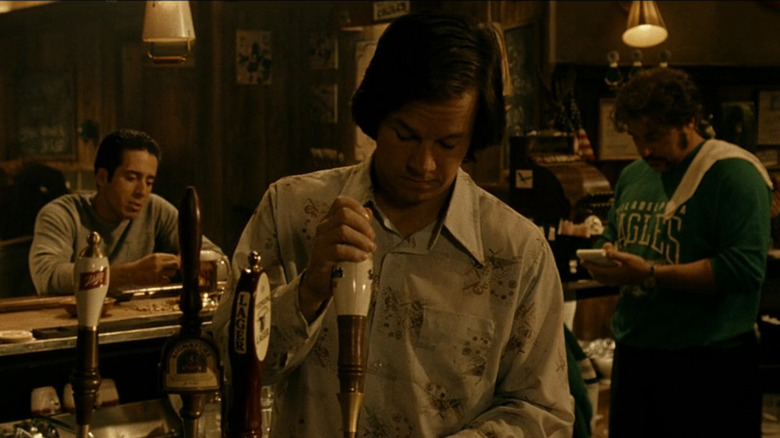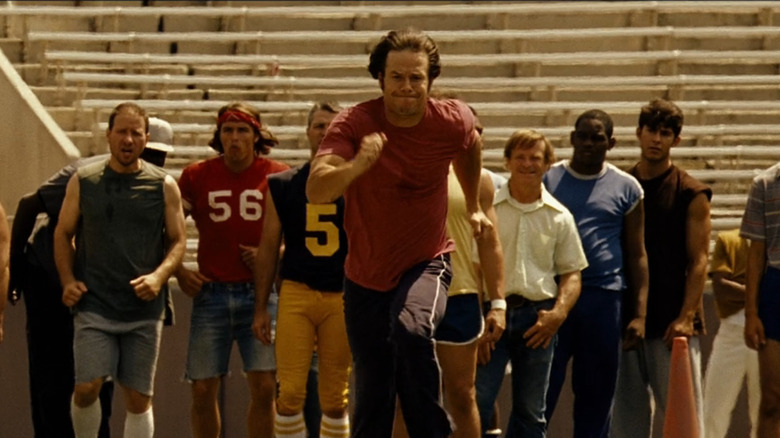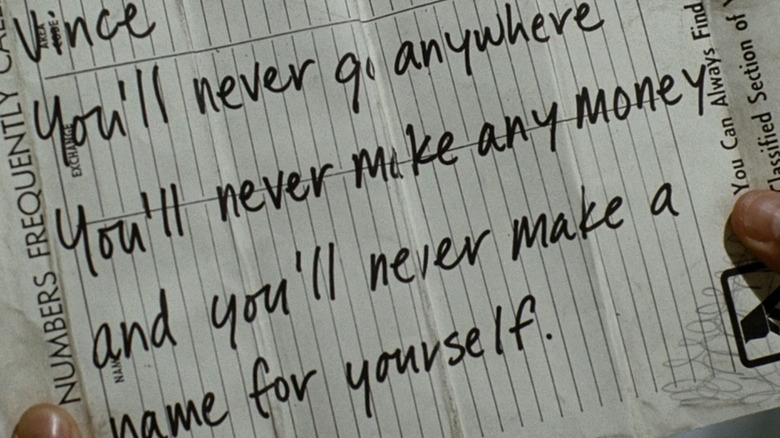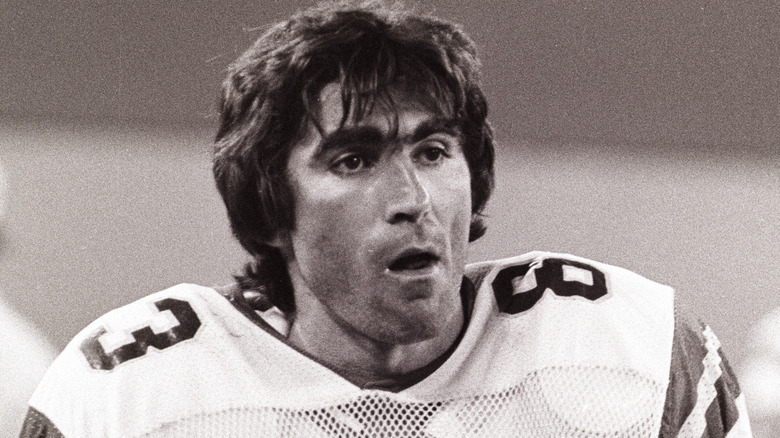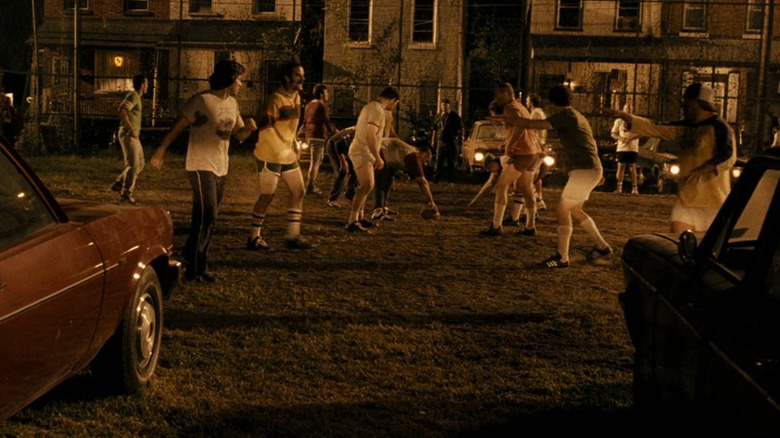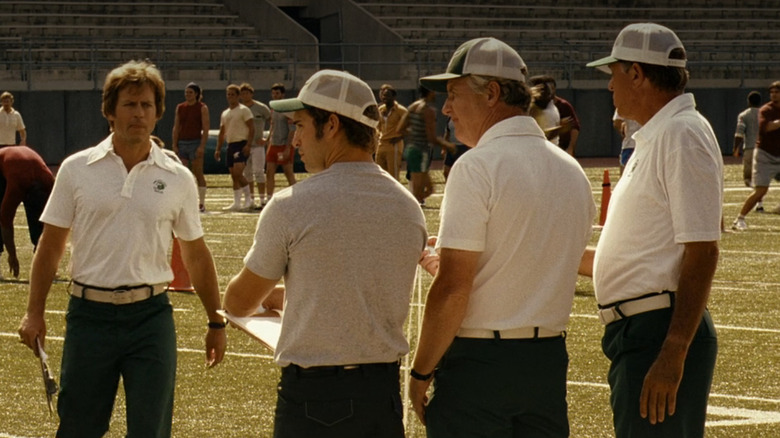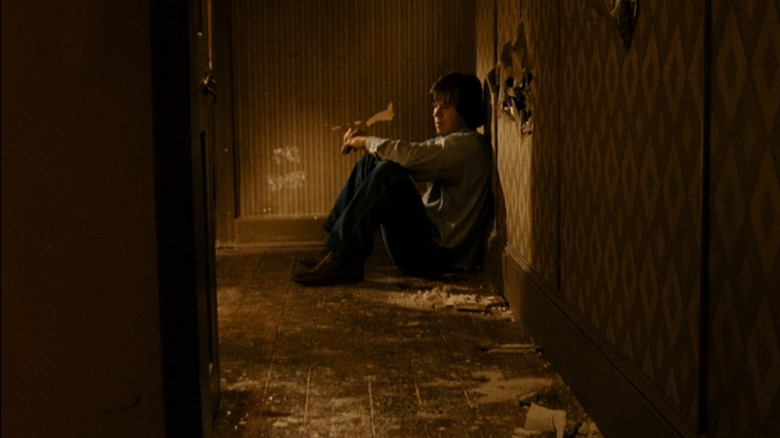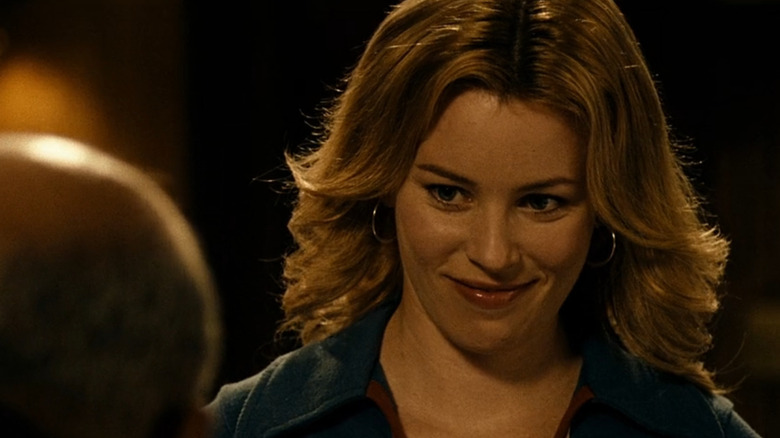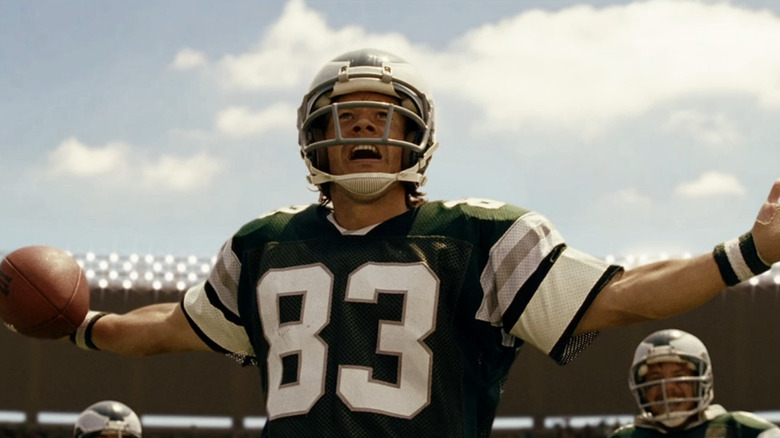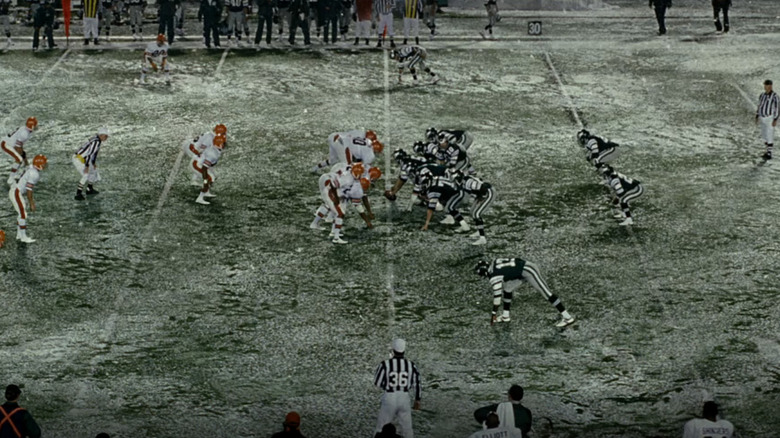Everything Invincible Doesn't Tell You About The True Story
We may receive a commission on purchases made from links.
Philadelphia fans and their home team, the Eagles, go together like cheese and steak. For seasons before the Birds won a Superbowl — big shoutout to then-backup quarterback Nick Foles — the underdog spirit surrounding the team seemed to go hand in hand with the city it called home. The City of Brotherly Love may be the birthplace of America and the birthplace of Kobe Bryant, Joe Frazier, Tina Fey, Eve, Kevin Hart, and Will Smith, but it's almost never in the same conversation as cities like Los Angeles, New York, San Francisco, or Boston.
Given the devotion of the team's fan base and what the team means to the city it plays for, it's no wonder Disney's 2006 football drama "Invincible" about Vince Papale blew up in popularity like ex-Eagles safety, hall of fame inductee, and human sledgehammer Brian Dawkins used to demolish offensive strategies.
For the unfamiliar, Papale was a Philly local who made the Eagles roster in 1976 with no prior collegiate football experience at the age of 30. At that point, he was the oldest NFL rookie in history. He was a lightning rod on special teams and played three seasons with the Eagles. While the film is very entertaining, it's not particularly accurate to Papale's incredible story. Keep reading to find out everything "Invincible" doesn't tell you about the story.
Mark Wahlberg and Vince Papale have a slight difference in stature
The first thing any fan who lives and dies by the "Iggles'" Sunday performance will notice about "Invincible" is the decision to cast Mark Wahlberg in the title role. While there's nothing wrong with Wahlberg's acting or football performance in the film, the actor isn't equipped with the same stature as Vince Papale. In other words, Markie Mark stands at 5'8" and Papale stands at 6'2." In training camp scenes and in encounters with other players, everybody seems to loom over Wahlberg.
By all accounts, Papale's time at training camp was an unpleasant experience. He told Sports Illustrated in a 1977 feature on his career that his teammates basically hated him and resented the fact that a 30-year-old rookie may take a roster spot.
While Wahlberg's onscreen presence visualizes Papale's lived experience — Papale's movie teammates all literally look down on Wahlberg like they figuratively looked down on the real-life Papale — it doesn't capture some of the specific gifts that made Papale so special. Papale's size, speed, athleticism, and mental toughness made him a menace on special teams. Wahlberg captures Papale's spirit but misses the size that helped make the man a special teams weapon. If spirit was the only thing that mattered in the NFL, Monday morning quarterbacks would be on their way to multiyear contracts. Fortunately, the League vets with other metrics as well.
Vince wasn't quite Rocky Balboa
South Philly — a Philly neighborhood bordered by South Street and the Delaware and Schuylkill Rivers — maintains a special reputation. It's home to Little Italy and has a long tradition of housing immigrant communities in the city. It was also a mafia stronghold in the mid-20th century (via Philly Mag).
But a lot of its reputation comes from "Rocky." Rocky Balboa, the fictional boxer who launched a multidecade-spanning franchise played by Sylvester Stallone, lives in South Philly in the movie. His story minted the legend of South Philly toughness and the folks who give the city its color.
With all of this history, it's no wonder "Invincible" leans into Vince Papale's standing as a stalwart of South Philly. He's practically a real-life Rocky. Except for one thing: Vince Papale was born in Chester and grew up in Glenolden, a working-class suburb of Philly (via The Washington Post). None of this is to say Papale had no ties to the famous neighborhood.
Vince tended bar in South Philly and lived in the neighborhood intermittently throughout his 20s. So while Vince wasn't born in South Philly, he spent a lot of time there and quickly became a legend in the community (and the larger city) as soon as his spot in the Eagles' training camp was announced. He even told Sports Illustrated that South Philly really supported him during training camp and explained that his family, friends, and neighbors came to practice to cheer him on.
Vince led a runner's life before becoming a footballer
One of the largest parts of Vince Papale's life excluded from the film is the athlete's track career. Given his natural athleticism, speed, and smaller stature in high school, Vince found enormous success on the track in his teens and during his college career. A Sports Illustrated feature on Papale reported Papale broke his school's pole vaulting record in his very first dual meet appearance. Then his senior year, he broke his own record. Papale competed on the Interboro High School Football varsity squad too, though only for one year.
Papale's high school success landed him a scholarship to St. Joseph. Once there, Papale set school records and was top scorer in the Middle Atlantic Conference meet twice. His then-coach, Kevin Quinn, said Papale was "the best natural athlete [Quinn] had ever coached." After college, Papale hoped to compete in the Olympic decathlon.
Interestingly, none of this made it into Disney's "Invincible." In fact, it's not even mentioned in the movie. Papale claimed in a podcast interview on an episode of "Mike Vaccaro In The Front Row" that his previous athletic achievements were cut due to the film's budgetary restrictions. However, excluding Vince's backstory also adds to the film's folk-hero vibe, established by playing Jim Croce's "I Got a Name" in the opening credits. In other words, seeing Papale excel at track would've been interesting, but it would've made his 4.5-second 40-yard dash at age 30 seem less magical.
The movie simplifies Vince's relationship with his first ex-wife
When the audience meets Vince Papale in "Invincible," he's a married 30-year-old part-time substitute teacher who tends bar at night. Recession and deindustrialization loom over the city of Philadelphia like fans over a cooler at a tailgate. His wife, Sharon Papale (Lola Glaudini), isn't particularly happy with her husband's seeming lack of motivation to better himself.
Eventually, Sharon has enough. She leaves Vince and writes one of the coldest break-up notes in film history. It reads, "You'll never go anywhere. You'll never make any money and you'll never make a name for yourself." However, the film places the event right before Vince is given the opportunity to try out for the Eagles. In real life, Papale's first wife left him in 1971, four years before the events of "Invincible," but the note was real (via IGN).
In the end, Papale got the last laugh (it's even the title of a book he co-authored). Papale said his first ex-wife did give him a call after it was announced that he made the Philadelphia Eagles. But he felt that if he hadn't been good enough for her then, why should he be with her now? Interestingly enough, Papale does concede the note may have been the wake-up call he needed to unlock his own potential. Considering he went from bartender to pro football player in just over four years — the note seemed to do the trick.
Before becoming Invincible, Vince was a semi-pro
Another portion of Vince Papale's athletic history excluded from the movie is his time playing amateur pro football. In the movie — as in real life — players making it to the NFL without college ball experience happens about as often as New York Jets fans get joy from their team's performance (remember the butt fumble). In other words, it doesn't happen a lot.
So again, while the film's portrayal of Papale's story leans into the urban legend — bartender turned "Iggle" — it leaves out more of Papale's athletic achievements. For example, Papale started playing semi-professional football for the Aston Knights. He was the second leading receiver in the division the Knights competed in — the Seaboard Football League — in 1973 (via Sports Illustrated). He finished that season with 60 receptions. Then at age 28, Papale got an offer to try out for the World Football League's Philadelphia Bell. Papale was selected for the team out of the 800 candidates who tried out, beating out ex-NFL veterans. Papale started at split end and got into the shuffle on special teams as well.
Unfortunately, his good fortune didn't last for long. The World Football League folded in 1975, and Papale once again found himself out of an athletic job, wondering if his competitive career was over. While this is the Papale the audience meets in the film, the movie doesn't say a thing about Papale's semi-pro career.
Vince's team's rough touch was really rough
One of the movie's seemingly more unbelievable touches is Vince Papale's participation in a local bar league with full-contact, no-pad games held in South Philly lots. However, this league is real. In real life, it's called the Delco (Delaware County) Rough Touch League and it still exists to some form to this day.
In an interview with Sports Illustrated, Papale said he played for four Delco League teams from 1969 until he joined the Philadelphia Eagles in 1976. Like the movie, the real-life games were rough. Papale remembers their playing field (located behind a bar called T-Bar) being covered in "rocks and broken beer bottles." He also recalls how rough the league was. The Delco league had, he said, "more fights than touchdowns" and he said that in his time representing local watering holes in competitive contests, he received "three broken ribs, a dislocated jaw and a couple of concussions." The film doesn't go far enough, as Papale said (per IGN) the games are "nothing compared to how they were in real life. We got to the point where we really did need to have police on board all the time."
However, the movie does include a scene where Vince reunites with his buddies for a rough touch game the week before his second NFL appearance. Papale confirmed this is fiction. No player in their right mind — even one as tough as "in-Vince-ible" himself — would ever risk an avoidable injury before a game. Especially when you're an Eagle and your upcoming match is your division rival and general football bad guys the New York Giants.
Invincible makes the tryout seem more unusual than it was
Arguably the most famous part of Vince Papale's story is his supposed appearance and discovery at an open Eagles tryout held by then-new Philadelphia Eagles Coach Dick Vermeil (Greg Kinnear). However, Papale didn't just simply go to the tryouts on a whim. In reality, Papale received the opportunity to go to an open free-agent rookie camp with the help of his manager in the spring of 1976 (via Sports Illustrated).
While this tryout was technically open, Papale told IGN in an interview that it wasn't "the circus" portrayed in the movie. He went on to say the onscreen depiction was a "bit of Hollywood." An open free-agent tryout also wasn't as of underheard of at the time that movie makes it appear to be. In an interview with ESPN's Page 2 following the release of the film, Vermeil said a "number of teams" held free-agent tryouts and that he got the idea from working under Hall of Fame Coach George Allen. Plus without a first-, second-, or third-round draft pick before the upcoming 1976 season, he felt he had to get resourceful when it came to finding new talent. He also hoped the open tryouts would reinvigorate fan interest in the Eagles franchise following a few terrible seasons.
While Disney's version allows for a fun cameo from Philly restauranteur Tony Luke Jr. as "cape-clad fan," it certainly doesn't dive into the reasons driving Vermeil's fateful decision to hold an open tryout.
Invincible cuts one of Vince's wives out altogether
Vince Papale's pre-Eagles athletic career was likely removed for budgetary reasons and to frame Vince as the ultimate Philly folk hero. However, it's harder to discern a reason for the film's biggest exclusion: Papale's second wife, Sandy Bianchini.
"Invincible" follows about a 10-month window from the end of the Eagles 1975 season to the beginning of the Eagles 1976 season. In that time, Papale tried out for a spot with the Birds, fought through camp, and eventually made the team. All along, he was supported by his second wife, Sandy. Papale said his second wife's support meant everything to him (per Sports Illustrated), saying, "Thank God for Sandy. [...] She kept my spirits up when I would've quit otherwise." Yet she does not appear in the movie.
It's hard to know why the call to exclude Sandy from "Invincible" was made. Likely, the studio sacrificed Sandy in the name of putting a more conventional romance in the film. It could also have something to do with Papale and Bianchini's 1983 divorce. Either way, it was not a decision Sandy took lightly. After the film's release, it was reported Sandy sent a letter to various media outlets asking just why exactly her role in Vince's life had been removed from the movie (via Los Angeles Daily News). "Invincible" doesn't suffer from its Disneyfied romance; however, it's always good to take a movie's "truth" with a grain of salt.
The movie invents parts of Vince and Janet's romance
In the movie, Vince Papale's third wife, Janet Papale (the always-wonderful Elizabeth Banks), blows into Vince's life like Eagles' defensive tackle Fletcher Cox blows through an O-line. They meet, flirt, fall in love, and ride off into the sunset. While it's fun on film, it's entirely fiction. In an appearance on the "Mike Vaccaro In The Front Row" podcast, Papale told host Mike Vaccaro he met Janet, "the love [his] life," in 1992, almost two decades after the events depicted in "Invincible."
While Banks' New York Giants-loving bartender creates hilarious moments between Janet and the South Philly patron she serves, the real-life Janet Papale was a far sight away from bartending in the 1970s. In fact, in 1970, at the age of 16, Janet earned a spot on the USA gymnastics team (Papale says he refers to his wife as the "jock in the family").
By 1976, Janet Papale balanced coaching gymnastics at the University of Pennsylvania with time spent working on a postgraduate degree at Wharton School of Business. Eventually she moved into real estate and even had her own opportunity for Eagles-adjacent work. In 2021, she listed the home of ex-Eagles Coach Doug Pederson on the market for Long & Foster Cherry Hill/Haddonfield after Pederson was fired (via The New York Post).
Invincible fumbles some history
In the final uplifting moments of the movie, "Invincible" recreates the Eagle's 1976 home-opener against the New York Giants. In the movie, as in real life, the Eagles' season was off to a terrible start. They'd been smoked by NFC East competitors the Dallas Cowboys 7-27 the week prior and now had to face another major rival. Both Vince Papale and Vermeil were staring down the barrel of their first regular season appearance on the grass at Veterans Stadium.
In the movie, the final game is portrayed as a knock-down-drag-out fight between the teams' dueling defenses. It's so close — the Eagles look like they may lose. Then, Papale recovers a punt return fumble for a touchdown to win the game. It's a glorious movie moment. The crowd swells and Wahlberg's Vince opens his arms wide to the cheers of CG fans.
Unfortunately, that's not exactly how the play went down. Vince recovered a fumble and ran the football into the endzone. However, the recovery was ruled a muff (via The Los Angeles Times). The NFL's muff rule prevents players from advancing a ball they've touched before they had possession. In other words, since Vince heroically knocked the ball wild with his body from the hands of the Giants' receiver, he couldn't run the ball in for a touchdown. The Eagles converted the turnover into a touchdown in the next few drives. So in reality, Papale only created the opportunity to score against the Giants — he didn't score himself.
Invincible does some Hollywood box score-shuffling
Another historical reality "Invincible" forgoes in the spirit of crafting a 20th-century folk tale is box scores. It's understandable that Hollywood heads care more about making a dramatic story more than recreating a by-the-numbers rundown of games past. However, in today's world of extreme record-keeping and sports commentary widely reliant on deep data analysis, the movie is definitely guilty of shaving points to land its big punches.
For example, the final game of Eagles versus Giants is made to look like a nail-biter. In reality, the Eagles had the Giants handily beat. The final score was 20-7 Eagles, and the Giants didn't even score until the fourth quarter, when the Birds were already ahead by 20 points.
Another example occurs in the opening scene, which recreates an Eagles versus Cincinnati Bengals game from 1975. To clue modern audiences into how bad the '70s Eagles were performing, a fan remarks that the Eagles shouldn't be losing to a team worse than them like the Bengals. However, the 1975 Bengals were a pretty strong team. They closed the season out at 11-3. The 1975 Eagles finished at 4-10.
While it's hard to know exactly why some dialogue decisions are made, the line is likely screenwriter shorthand designed to get contemporary audiences up to speed on the lowly status of the Eagles in 1975. It's a minor inaccuracy, sure, but it's enough to raise the eyebrow of any diehard football fan.
